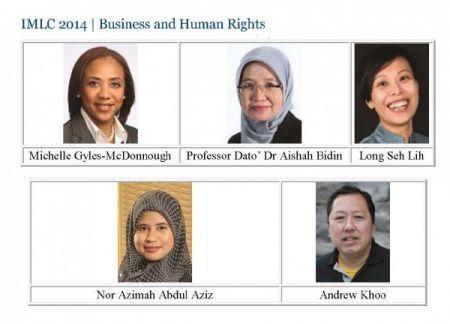This article was written by Andrew Khoo for the Malaysian Bar and originally published on 23 September 2014 here.
Why should human rights and business matter for businesses, including law firms? Find out at the IMLC 2014, 26 September 2014, Breakout Session 8, Stream C. Speakers include Michelle Gyles-McDonnough (United Nations Resident Coordinator for Malaysia), Professor Dato’ Dr Aishah Bidin (SUHAKAM Commissioner), Long Seh Lih (MCCHR), and Nor Azimah Abdul Aziz (Director of the Corporate Development and Policy Division, CCM), and moderated by Andrew Khoo (Co-Chairperson of the Human Rights Committee of Bar Council Malaysia).

On 16 June 2011, the United Nations Human Rights Council endorsed the “Guiding Principles on Business and Human Rights: Implementing the United Nations ‘Protect, Respect and Remedy’ Framework”. These Guiding Principles were developed by the Special Representative of the Secretary-General on the issue of human rights and transnational corporations and other business enterprises, Professor John Ruggie, and his team.
The Guiding Principles recognise the role of business enterprises as specialised organs of society performing specialised functions, and require them to comply with all applicable laws and to respect human rights. These principles apply to all business enterprises, both transnational and others, regardless of their size, sector, location, ownership and structure.
What this means for business enterprises is that they should avoid infringing on the human rights of others and should address adverse human rights impacts with which they are involved. This requires that business enterprises: (a) avoid causing or contributing to adverse human rights impacts through their own activities, and address such impacts when they occur; and (b) seek to prevent or mitigate adverse human rights impacts that are directly linked to their operations, products or services by their business relationships, even if they have not contributed to those impacts.
It also requires business enterprises to reflect their commitment to protect and respect human rights in operational policies and procedures, conduct human rights due diligence and undertake human rights impact assessments of their business operations. Business enterprises are also to have effective remedy and redress mechanisms in place to address breaches of human rights in their workplace and business activities.
Why should this matter to us? For one thing, the responsibility to uphold, promote and protect human rights does not rest solely with governments. Non-state actors, which include business enterprises, also have a role to play in ensuring that human rights are not violated. The same is true for government-linked enterprises, which perhaps have a greater responsibility because of their ownership links with the state.
How has this overall framework been implemented in Malaysia? What is the level of knowledge of and compliance with these Guiding Principles in Malaysia? Four speakers, all women, will take us through the session simply entitled “Business and Human Rights”. Michelle Gyles-McDonnough, the United Nations Resident Coordinator for Malaysia, will kick the session off by giving an overall view and international perspective of the genesis and development of the Guiding Principles. As concurrent United Nations Development Programme (“UNDP”) Resident Representative, Michelle will also be able to share from the perspective of business and human rights and how it assists in the process of economic development.
This will be followed by a presentation from Professor Dato’ Dr Aishah Bidin, who is a Commissioner of the Human Rights Commission of Malaysia (“SUHAKAM”), Professor of Corporate and Insolvency Law, and Dean of the Faculty of Law at the National University of Malaysia (Universiti Kebangsaan Malaysia, “UKM”). She will speak on efforts by SUHAKAM to disseminate knowledge and information about the Guiding Principles to business enterprises and other stakeholders in Malaysia.
Long Seh Lih, Co-Founder of the Malaysian Centre for Constitutionalism and Human Rights (“MCCHR”, perhaps more popularly known as Pusat Rakyat LoyarBurok) will weigh in on the work done by MCCHR, and what can be done by non-governmental organisations in general, in advancing public awareness in the area of business and human rights. Seh Lih brings with her a wealth of experience, having previously worked for SUHAKAM and for the United Nations in Afghanistan and Timor-Leste.
With the Companies Commission of Malaysia (“CCM”) currently in the process of amending the Companies Act 1965 to include corporate social responsibility reporting obligations in the annual report and other regulatory disclosures as part of the law, it is timely for business enterprises in Malaysia to sit up and take note of their ever-increasing obligations and responsibilities in an expanding rules-based globalised business world. Nor Azimah Abdul Aziz, Director of the Corporate Development and Policy Division at CCM, will provide input on how the regulatory environment is changing to recognise, incorporate and reflect this new thinking.
Andrew Khoo, Co-Chairperson of the Human Rights Committee of Bar Council Malaysia, will moderate this IMLC 2014 session.

To begin with: Men together with women connected with ages attain very creative and incredibly convincing concerning justifying together with explaining to one side why success is now out in their own get to. I don’t imagine that some in their factors usually are valid in the physical entire world. http://www.favientertainment.net
Additionally, firm abs last thing you choose is to hold back for hours that you simply transfer docs. If you can be moving substantial files which might be larger than the usual few kilobytes, you should consider the go speed on the drive. http://www.itstechnology.net
No matter if the drive you're planning to acquire is substantial enough there are the expected security features it can be of hardly any value if perhaps it sheds apart after having a little wear and tear. http://www.nyctechnology.net
For anyone who is planning of purchasing a completely new HARDWARE adobe flash generate or are simply just interested within the upgrade there are various factors that you consider that you simply buy the most beneficial unit. http://www.technology2.net
Why will it be important for rug cleaning professionals to and also the most new carpet established technologies? Because it means that you can stay in the know on the types regarding floors you can be cleaning. http://www.technologyacceleration.net